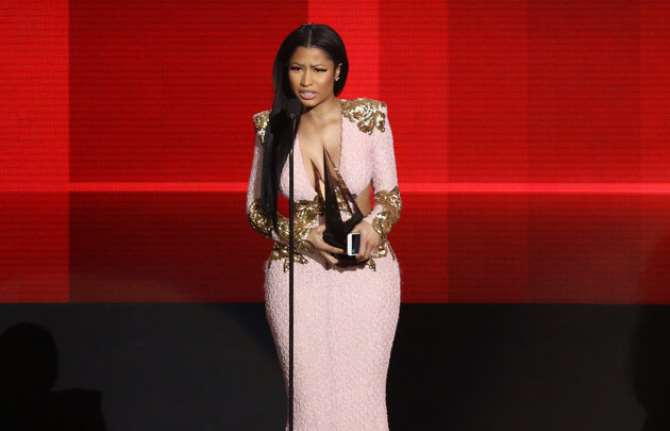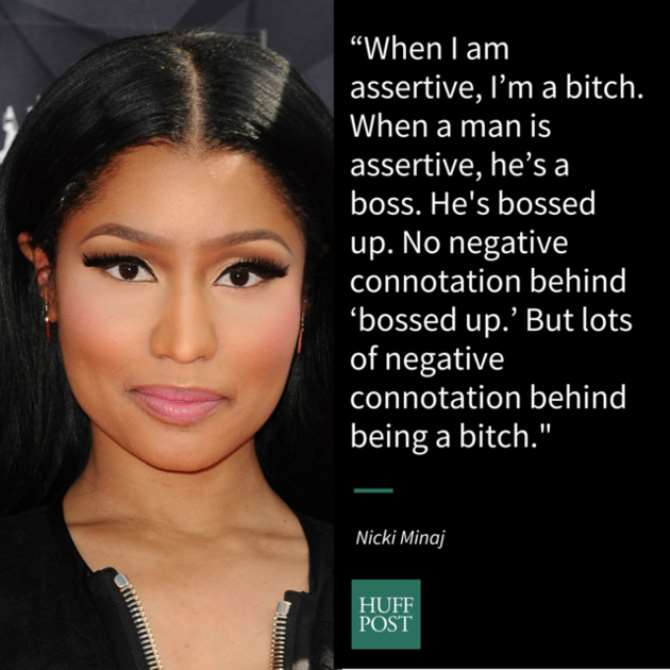Why We Need Nicki Minaj
Michael Tran via Getty Images
On last night’s VH1 Big In 2015 special , hip-hop legend Queen Latifah praised Nicki Minaj as “one of the greats.”
“You've become an inspiration everywhere,” Latifah said. “I love how you were never afraid to speak your mind. You're a strong woman. You refuse to be backed into a corner.”
To be applauded as a “force within the hip-hop community” by one of the most important rappers in the game — male or female — is just another of the amazing feats Minaj (who turns 33 today) has achieved in the past year.
The Trinidadian, Queens-raised Minaj released her album “The Pinkprint,” scoring hits with singles including “Anaconda” and “Feeling Myself” and gaining several award noms, most recently from the Grammys.
But it’s Minaj’s unapologetic need to speak her mind that has been the most compelling thing about her this year. Of course, Minaj has always been outspoken and unafraid to call out double standards — in 2010 she famously skewered the sexist connotations of calling women “bitches” and men “bosses” for doing exactly the same things in business.
In 2015, however, Minaj was perhaps the most vocal she’s ever been when it came to race and gender. She called out the unfair contrast between reactions to her barely-there bikini on her “Anaconda” album art , and thinner, mostly white women on the covers of Sports Illustrated or on Victoria’s Secret runways.
In July, there was the Taylor Swift situation, wherein Minaj once again questioned the treatment of black female artists in the industry via her Twitter, prompting Swift to send her a peak white feminist tweet chastising Minaj for “pitting women against each other.”
And of course, you can’t forget Minaj’s “Miley, what’s good?” moment at the MTV VMA’s in August, when she publicly confronted Miley Cyrus for earlier comments she made about Minaj in a New York Times interview. “If you want to make it about race, there's a way you could do that,” Cyrus said, adding, “What I read sounded very Nicki Minaj, which, if you know Nicki Minaj is not too kind. It's not very polite.”
Nicki Minaj is certainly an imperfect icon. There’s a lot to unpack about her persona, including the fact that while bucking certain beauty standards she also conforms to many others (light skin, slim waist, straight hair). She’s made numerous mistakes , and she’s said things that have raised eyebrows as much as they’ve gained applause.
But as a current dominating force in hip-hop, Minaj sits in a precarious position where people want her to be brash and outspoken — but not too much. They expect her to play into the “boss bitch” persona, but when it makes them uncomfortable or feel threatened, suddenly she’s being rude, aggressive, ungrateful, not very polite.
In many ways, Nicki Minaj’s narrative is one that all black women have to deal with. We’re branded as “strong” to the point where we’re not allowed to express any form of vulnerability. When we assert ourselves, we’re angry. Our sexuality is commodified and fetishized, but when we choose to take ownership over it (and profit from it) we’re labeled as whores.
Minaj may not be perfect, she may not be radical or deeply political, but her unapologetic insistence on existing in the mainstream on her own terms and expressing her opinions regardless of how she will be framed is refreshing. In a pop culture landscape where so often black entertainers are encouraged not to ruffle feathers, Minaj’s approach is a reminder that it’s within every black woman’s power to change the narrative.
The post Why We Need Nicki Minaj appeared first on THE RAINBOW NEWS ONLINE .


